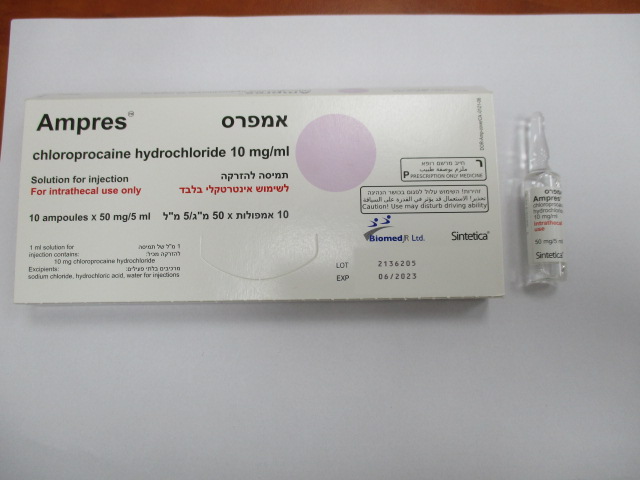Quest for the right Drug

אמפרס AMPRES (CHLOROPROCAINE HYDROCHLORIDE)
תרופה במרשם
תרופה בסל
נרקוטיקה
ציטוטוקסיקה
צורת מתן:
תוך-שדרתי : INTRATHECAL
צורת מינון:
תמיסה להזרקה : SOLUTION FOR INJECTION
עלון לרופא
מינוניםPosology התוויות
Indications תופעות לוואי
Adverse reactions התוויות נגד
Contraindications אינטראקציות
Interactions מינון יתר
Overdose הריון/הנקה
Pregnancy & Lactation אוכלוסיות מיוחדות
Special populations תכונות פרמקולוגיות
Pharmacological properties מידע רוקחי
Pharmaceutical particulars אזהרת שימוש
Special Warning עלון לרופא
Physicians Leaflet
Special Warning : אזהרת שימוש
4.4 Special warnings and precautions for use Some patients require special attention in order to reduce the risk of serious undesirable effects, even when locoregional anaesthesia constitutes the optimum choice for the surgical intervention: − Patients with total or partial heart block, since local anaesthetics can suppress myocardial conduction. − Patients with high grade cardiac decompensation. − Patients with advanced liver or kidney damage. − Elderly patients and patients in poor general condition. − Patients treated with class III antiarrhythmic medicinal products (e.g. amiodarone). These patients should be subjected to careful observation and ECG monitoring, since cardiac effects may be added (see section 4.5). − In patients with acute porphyria, Ampres should only be administered when there is a compelling indication for its use, as Ampres may potentially precipitate porphyria. Appropriate precautions should be taken in all patients with porphyria. − Since ester-type local anaesthetics are hydrolyzed by plasma cholinesterase produced by the liver, chloroprocaine should be used cautiously in patients with advanced hepatic disease. − Patients with genetic deficiency of plasma cholinesterase. Ensuring the presence of reliable venous access is mandatory. In high risk patients, the recommendation is to improve their general condition prior to the intervention. A rare, but serious, undesirable effect of spinal anaesthesia is high or total spinal block, with consequent cardiovascular and respiratory depression. Cardiovascular depression is induced by an extended block of the sympathetic nervous system, which may induce severe hypotension and bradycardia to the point of cardiac arrest. Respiratory depression is induced by the block of the respiratory musculature and the diaphragm. Especially in elderly patients there is an increased risk of high or total spinal block: consequently, it is advisable to reduce the anaesthetic dose. Particularly in the case of elderly patients, an unexpected drop in arterial pressure may occur as a complication of spinal anaesthesia. Rarely, neurological damage may occur after spinal anaesthesia, manifesting as paresthesia, loss of sensitivity, motor weakness, paralysis, cauda equina syndrome and permanent neurological injury. Occasionally these symptoms persist. There is no suspicion that neurological disorders, such as multiple sclerosis, hemiplegia, paraplegia or neuromuscular disorders may be negatively influenced by spinal anaesthesia. Nevertheless, it should be used with care. Careful evaluation of the risk-benefit ratio is recommended prior to treatment. In case of unintentional intravascular injection severe systemic toxicity may occur immediately (see section 4.9). This medicinal product contains less then 1 mmol sodium (23 mg) per dose (maximum dose equal to 5 ml of Ampres), that is to say essentially “sodium-free”.
Effects on Driving
4.7 Effects on ability to drive and use machines Ampres has major influence on the ability to drive and use machines. The doctor is responsible for deciding in each individual case if the patient can drive or use machines.

שימוש לפי פנקס קופ''ח כללית 1994
לא צוין
תאריך הכללה מקורי בסל
לא צוין
הגבלות
לא צוין
מידע נוסף
